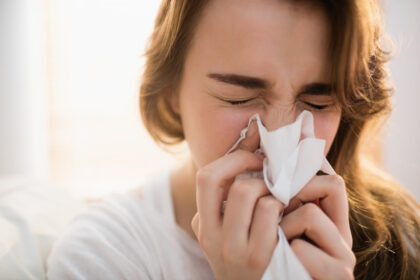Allergies are among the most common chronic conditions worldwide.
Ever wondered why some folks start sneezing like crazy when flowers bloom, or why your friend can’t have that extra scoop of peanut butter without turning into a human balloon?
Well, you’re not alone!
Allergies, those sneaky little troublemakers, affect loads of us and come in all shapes and sizes.
An allergy occurs when the body’s immune system reacts to a foreign substance—such as pollen, bee venom, pet dander, or food—that doesn’t cause a reaction in most people.
Understanding allergies is crucial as they can significantly impact one’s quality of life.
And guess what?
Managing allergies isn’t all gloom and doom.
We’ll spill the beans on practical solutions, from avoiding triggers to trying out cool new treatments that might make life a bit easier for allergy warriors.
An allergic response occurs when the immune system becomes overly sensitive to various substances like foods, pollen, medications, bee venom, and more.
Exposure to these allergens can trigger symptoms such as swelling and hives.
An allergen, the culprit behind an allergic reaction, is usually an everyday substance that’s harmless to most people.
However, anything can turn into an allergen if the immune system reacts adversely to it in a specific way.
The immune system’s primary job is to eliminate harmful substances in the body.
If someone is allergic to a particular substance, their immune system perceives it as a threat and attempts to eradicate it.
Every year, over 50 million people in the United States undergo allergic reactions, leading to symptoms like swelling.
If swelling affects the airways, it can pose a life-threatening risk.
In this article, discover more about the factors that contribute to the risk of allergies, recognize their symptoms, and explore the available treatments.
What is an Allergy?
An allergy is an exaggerated or hypersensitive response of the immune system to a substance that is typically harmless to most people.
This substance, known as an allergen, can be anything from pollen and certain foods to medications, insect venom, or pet dander.
When an allergic individual comes into contact with the allergen, their immune system reacts by producing antibodies, leading to the release of chemicals such as histamines.
These chemicals cause allergic symptoms, ranging from mild issues like sneezing and itching to more severe reactions such as swelling, difficulty breathing, or anaphylaxis.
Allergies can vary widely in their intensity and impact, and they may be seasonal or chronic, affecting people of all ages.
Symptoms
Allergic reactions can manifest in a variety of symptoms, and the severity can range from mild to severe. Common symptoms of allergies include:
- Sneezing: Frequent and uncontrollable sneezing is a common symptom, especially in response to airborne allergens like pollen or pet dander.
- Runny or Stuffy Nose: Allergies often cause nasal congestion or a runny nose. This is due to the inflammation of nasal passages triggered by the immune response.
- Itchy or Watery Eyes: Irritation, redness, itching, and excessive tearing of the eyes are typical symptoms associated with airborne allergens.
- Skin Reactions: Allergies can lead to skin issues such as hives (raised, red, itchy welts on the skin) or eczema.
- Itchy Throat or Ears: Contact with allergens may cause irritation and itching sensations in the throat or ears.
- Coughing: Persistent coughing, often accompanied by throat irritation, can be a symptom of allergic reactions.
- Fatigue: Allergic reactions can sometimes lead to a feeling of tiredness or general fatigue.
- Shortness of Breath: In more severe cases, exposure to allergens can result in difficulty breathing or shortness of breath.
- Swelling: Allergic reactions may cause swelling, especially in areas like the face, lips, or tongue. In severe cases, this can lead to anaphylaxis.
- Gastrointestinal Symptoms: Some individuals may experience nausea, vomiting, abdominal pain, or diarrhea as part of their allergic response, especially if the allergen is ingested.
It’s important to note that symptoms can vary depending on the type of allergen, the individual’s sensitivity, and the route of exposure (inhalation, ingestion, skin contact, etc.).
Additionally, some allergic reactions can be life-threatening, requiring immediate medical attention.
If someone experiences severe symptoms like difficulty breathing or swelling of the face and throat, it’s crucial to seek emergency medical help.
Causes
In the event of an allergic reaction, allergens attach themselves to antibodies produced by the body known as immunoglobulin E (IgE).
Antibodies play a crucial role in combating foreign substances that may pose a potential threat to the body.
Upon binding to IgE, particular types of cells, such as mast cells, release chemicals that initiate the onset of allergic reaction symptoms.
One such chemical is histamine, which induces the contraction of muscles in the airways and blood vessel walls.
Additionally, it signals the nasal lining to increase the production of mucus.
Common Allergens
Allergens, those sneaky things that can cause allergies, are everywhere you look.
Basically, someone can be allergic to almost any food.
Even certain parts of food, like gluten in wheat, can set off reactions.
The top eight foods that often cause allergies are:
- Eggs, especially the whites
- Fish
- Milk
- Peanuts
- Tree nuts
- Shellfish like crabs or shrimp
- Wheat
- Soy
But it’s not just about food.
Other common things that can cause allergies include:
- Furry pets, their dander (tiny skin flakes), and even their spit
- Mold and mildew
- Some medicines, like penicillin
- Insect stings and bites
- Bugs like cockroaches, caddisflies, midges, and moths
- Pollen from plants
- Stuff you use around the house, like cleaning products
- Metals like nickel, cobalt, chromium, and zinc
- Latex
So, allergies can pop up from all sorts of things we come across in our daily lives!
Diagnosis
Diagnosing an allergy involves a combination of medical history, physical examination, and specific tests.
Here’s an overview of the diagnostic process:
Medical History:
The doctor will ask detailed questions about your symptoms, their frequency and duration, and potential triggers.
They will inquire about your lifestyle, occupation, diet, and any recent changes that might be linked to your symptoms.
Physical Examination:
A thorough examination may help identify visible signs of allergies, such as skin reactions, nasal congestion, or respiratory issues.
Allergy Testing
Skin Prick Test: Small amounts of common allergens are applied to your skin using a tiny needle. If you’re allergic, you’ll develop a small raised bump at the test site.
Blood Tests: Specific blood tests measure the level of antibodies produced in response to allergens, providing information about the types and severity of allergies.
Elimination Diet:
If food allergies are suspected, a doctor may recommend eliminating certain foods from your diet and then reintroducing them to observe reactions.
Challenge Test:
Under medical supervision, you may be exposed to suspected allergens to observe and assess your body’s response.
Medical Imaging:
In cases of respiratory allergies, imaging studies like X-rays or CT scans may be used to assess the condition of the lungs and nasal passages.
Nasal Smear:
For respiratory allergies, a sample of nasal discharge may be examined under a microscope to identify specific cells indicative of allergies.
It’s important to consult with a healthcare professional for a proper diagnosis and personalized treatment plan.
Self-diagnosis or treatment without professional guidance may lead to inaccurate conclusions and ineffective management of symptoms.
Treatment
The best way to manage an allergy is to avoid the allergen, but this is not always possible.
In these cases, medical treatment can help.
Here are common approaches:
Allergen Avoidance:
Identify and avoid allergens triggering your symptoms.
Make lifestyle changes, such as using air purifiers or hypoallergenic bedding.
Medications:
- Antihistamines: Block histamine, reducing symptoms like sneezing and itching.
- Decongestants: Relieve nasal congestion.
- Nasal Corticosteroids: Reduce inflammation in the nasal passages.
- Bronchodilators: Open airways for respiratory allergies.
- Epinephrine: Emergency treatment for severe allergic reactions (anaphylaxis).
Immunotherapy:
- Allergy Shots: Gradually expose the body to small amounts of allergens to build tolerance over time.
- Sublingual Immunotherapy (SLIT): Allergen extracts are placed under the tongue to induce tolerance.
Emergency Medications:
Carry an epinephrine auto-injector for severe allergic reactions.
Have a written anaphylaxis action plan.
Home Remedies:
Use saline nasal sprays or rinses for nasal symptoms.
Apply cold compresses to reduce skin inflammation.
Stay hydrated to thin mucus and soothe throat irritation.
Alternative Therapies:
Some people explore acupuncture, herbal supplements, or homeopathy, though evidence supporting their efficacy varies.
For skin allergies, dermatologists can provide specialized care.
It’s crucial to work with healthcare professionals to develop a personalized treatment plan.
Self-diagnosis and treatment without expert advice can lead to ineffective or potentially harmful outcomes.
If you suspect allergies, consult a healthcare provider to determine the most suitable course of action for your specific situation.
Conclusion
In conclusion, the intricate world of allergies, with its diverse causes, diagnostic approaches, and multifaceted treatments, underscores the significance of understanding and managing these often-perplexing immune responses. As we navigate through the myriad triggers, from common environmental allergens to specific food components, it becomes evident that allergies can manifest in various forms, affecting individuals of all ages and backgrounds. The diagnostic journey, involving meticulous medical history assessments, physical examinations, and specialized tests, is essential for unraveling the complexities of allergic reactions. From skin prick tests to blood analyses, these diagnostic tools provide valuable insights, guiding healthcare professionals toward accurate identification of allergens and the formulation of tailored treatment strategies. Speaking of treatments, the array of available options underscores the dynamic nature of allergy management.
From allergen avoidance strategies to the judicious use of medications, including antihistamines and corticosteroids, individuals can find relief from the bothersome symptoms that allergies bring. Moreover, the innovative realm of immunotherapy offers promising avenues for building tolerance and mitigating the underlying hypersensitivity that characterizes allergic responses. The emphasis on personalized care is a recurring theme, as each person’s experience with allergies is unique. Home remedies, alternative therapies, and the indispensable role of emergency medications like epinephrine underscore the need for a comprehensive and individualized approach to allergy management.
FAQs
What are the common causes of allergies?
Allergies can be triggered by a range of factors, including airborne allergens like pollen and pet dander, specific foods such as peanuts or shellfish, insect stings, medications like penicillin, and even everyday items like latex or certain metals.
How are allergies diagnosed?
Diagnosis involves a combination of methods.
Medical history discussions, physical examinations, and specific tests such as skin prick tests or blood analyses help identify allergens.
Elimination diets, challenge tests, and, in some cases, imaging studies may be employed to provide a comprehensive understanding.
Can allergies be cured?
While allergies cannot be completely cured, their symptoms can often be effectively managed.
Treatment strategies include allergen avoidance, medications such as antihistamines, corticosteroids, and, in severe cases, immunotherapy.
These approaches aim to alleviate symptoms and, in the case of immunotherapy, build tolerance over time.
Are there alternative therapies for managing allergies?
Some individuals explore alternative therapies like acupuncture, herbal supplements, or homeopathy.
While these may provide relief for some, it’s crucial to consult with healthcare professionals for evidence-based guidance, as effectiveness can vary.
What should I do in case of a severe allergic reaction (anaphylaxis)?
For severe allergic reactions, known as anaphylaxis, immediate administration of an epinephrine auto-injector is crucial.
Emergency medical attention should be sought promptly.
Individuals with known severe allergies should carry an epinephrine injector and have a written anaphylaxis action plan.
How can individuals actively manage their allergies on a daily basis?
Daily management involves identifying and avoiding allergens, using prescribed medications as directed, and incorporating lifestyle changes.
This may include using air purifiers, hypoallergenic bedding, and maintaining open communication with healthcare providers to ensure a personalized and effective management plan.





